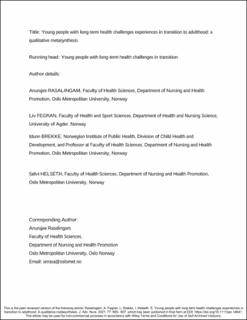Young people with long-term health challenges experiences in transition to adulthood: A qualitative metasynthesis
Peer reviewed, Journal article
Accepted version
Permanent lenke
https://hdl.handle.net/11250/2758931Utgivelsesdato
2020-11-27Metadata
Vis full innførselSamlinger
Originalversjon
Journal of Advanced Nursing. 2020, 77 (2), 595-607. https://doi.org/10.1111/jan.14641Sammendrag
Aims: The aim of this study was to describe the experiences of the transition to adulthood for young people with long-term health challenges. Design: The metasynthesis approach was based on the guidelines by Sandelowski and Barroso for synthesizing qualitative research. Data sources: Seven electronic databases: CINAHL, Medline, Embase, PsycINFO, Web of Science, Scopus and SocIndex were searched on 6-10 February 2020. Review Methods: Studies were critically appraised using the Joanna Briggs critical appraisal tool. Qualitative data were extracted, meta-summarised, then meta-synthesized. Findings: Nineteen qualitative studies were included in this review. Six themes illustrated experiences in the transition to adulthood: wishing for an “ordinary” life, significance of close network, working towards independence, in need of systemic resources and services, psychosocial challenges and keeping a positive attitude. Conclusion: Young people with long-term health challenges wished for as “ordinary” a life as possible in the future. In the transition to adulthood, they gradually gained more competence in self-management skills and knowledge and strived to become more independent. By having a positive attitude and utilising other coping strategies, young people can work on some of the difficulties they experience in this phase. However, to achieve and maintain independence young people with long-term health challenges are dependent on the support of a close network and systemic support and services. Impact: The findings highlight the need to help alleviate the fears and worries of young people with long-term health challenges and create opportunities for successful transition to adulthood by increased awareness and interventions from policy-makers and professionals within the health and social system.
